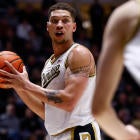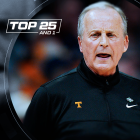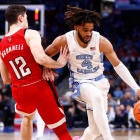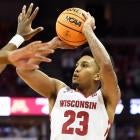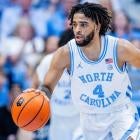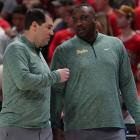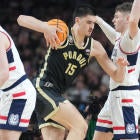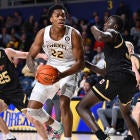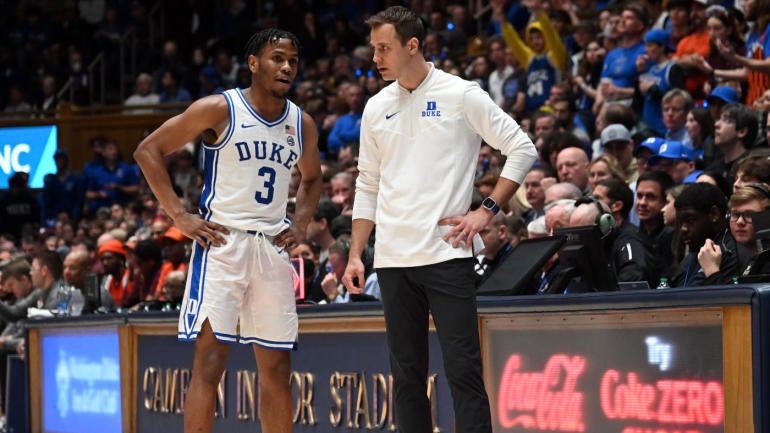
May is here, meaning we are (already) almost one full month into the offseason. Before the buzzer sounds, let's get off one last piece of reflection on 2022-23.
It's time for my annual appraisal of the first-year coaches who had the best debuts. Last year's coaching carousel had 60 coaching swaps, and in that group, a dozen of them really stood out from this past season.
I maintain that it is foolhardy to assign grades to coaching hires both right after they happen — and even one year into the job. We don't have enough data (or, in keeping with the trope: the homework hasn't been submitted yet) to truly/fairly evaluate these hires. We can, however, identify the coaches on their way to good returns after just one season. (Later this week, as I do annually, I will be grading the hires from four years prior. The 2019 class is up for assessment.)
To wit: Four of the seven coaches who earned acclaim in this piece a year ago had downturns (or worse) in '22-23: Mark Adams, Chris Beard, Hubert Davis and Drew Valentine. Two of those four were severed from their jobs, and the other two didn't make the NCAA Tournament after massively disappointing sophomore campaigns.
For today, I'm not only looking at which big schools and power-conference athletic directors did the best; there are some small-league coaches who stood out, and they're highlighted below as well. For the Big Six leagues, the biggest criterion remains unchanged: If you made the NCAAs in your first year of coaching in the ACC, Big East, Big Ten, Big 12, Pac-12 or SEC, you get a mention. That's the bar to clear. Six such coaches did that in '22-23.
In alphabetical order (by school), here they are.
2022's most immediately successful high-major hires
| Jon Scheyer, Duke: It was as good of a debut as Scheyer or anyone connected to Duke could have asked for. After arguably the greatest coach in college basketball history retired and Duke lost the No. 1 pick (and future Rookie of the Year) to the NBA (along with other first-round selections), the Blue Devils wobbled early but never faltered. Scheyer and company went 27-9, never lost a game at home (16-0), got the No. 4 seed in the ACC Tournament, then lost to Tennessee in the second round of the NCAAs. All told, that's a good introduction. Amid the newness of it all, Scheyer coached through a lot of injury issues on the way to a rock-solid first season on the job. He also coached a top-three freshman, Kyle Filipowski, who was the ACC's Freshman of the Year. After a satisfactory Year 1, Final Four hopes are bubbling around Durham heading into '23-24. | |
| Jerome Tang, Kansas State: Had FAU not made the Final Four (beating Kansas State in the East Regional final), Jerome Tang would have won National Coach of the Year here at CBS Sports. Even in spite of that, Tang did take home that honor from the Naismith committee; he also was the Big 12 Coach of the Year after guiding the Wildcats to a 26-10 finish highlighted by an Elite Eight push as a No. 3 seed. K-State tied for third place in the toughest league in the country after being picked last in the preseason. He also coached two CBS Sports All-Americans, the only school where that applied last season. There haven't been but a dozen better debut seasons by a head coach in college hoops history, far as I can tell. Tang waited 20 years to get his big shot and was a big hit right away. Can't wait to see how he adapts in Year 2. | |
| Kevin Willard, Maryland: Willard was a breath of fresh air in College Park, getting the Terrapins comfortably into the NCAA Tournament (as a No. 8 seed) and finishing 22-13 after losing in the second round to overall No. 1 Alabama. The Terps went 11-9 in the Big Ten. If you make the tournament in your first season at a power-conference post, you've passed the test no matter what. There's a freshness around this program at the moment that is exciting. Looking to November, Willard will have notable roster turnover for the second straight season. | |
| Chris Jans, Mississippi State: The Bulldogs weren't the easiest watch, but they made it to the Big Dance and won 21 games. MSU fans are going to take that almost every single year. There were 13 losses leaned up against those 21 wins. Jans' team was an 11-seed and lost 60-59 to Pitt in the First Four. But here's the thing: It was only the second NCAA Tournament for this program since 2009. This was a really good year for the Bulldogs. Jans was viewed as a great fit when he was hired a year ago and that proved true in the first 11 months on the job. | |
| Dennis Gates, Missouri: It was only a matter of time before Gates got a big job. Thanks to some longstanding connections, it wound up being Missouri. One year in, it's been mostly enjoyable. Though it ended ugly (No. 15 seed Princeton beat No. 7 Mizzou by 15 in the second round; it felt like double that), the season was a success. Missouri went 25-10, had no worries about making the NCAAs for basically the entire season and finished with its most wins since 2011-12. Beat Kentucky, Illinois and Tennessee, too. Arrow's in the right direction. | |
| Sean Miller, Xaver: Thirteen-plus months ago, Miller was debating between Xavier and South Carolina. He picked the right school. After four straight NIT-type seasons under Travis Steele, Xavier decided to start anew by going to someone who was an old, familiar face. Miller, who previously elevated X's program from 2004-09, overhauled his X-and-O philosophy and guided the Musketeers to a 27-10 season that ended in the Sweet 16 against No. 2 seed Texas. Xavier, for its part, built up the résumé of a 3-seed and patched up bruised feelings from the fan base. Miller may well be a factor near or at the top of the Big East from here on out. | |

Mid-major noisemakers one year in
I don't limit the shine to the high-major ranks. Here are six coaches at the mid-major level who made their mark in their first seasons after being hired in the spring of 2022. (Two of them have already moved to new gigs.)
| Daniyal Robinson, Cleveland State: Robinson was a sleeper candidate for CSU's job a year ago — coming by way of Iowa State — then he kept the Vikings competitive and near the top of the Horizon League much of the season. Robinson coached the 21-15 Vikings to the 15th best offensive-rebound rate in the sport and was one bucket away from winning an automatic bid to the NCAAs. | |
| Tobin Anderson, FDU: Without question the first-year star at the mid-/low-major level. Consider this: Anderson became a Division I coach a year go to the day of this story's publishing. FDU did not hire him until May 2, 2022. And from May 2 until early March, he quietly coached in obscurity. But thanks to an NCAA rule that prevented Merrimack (in its final year of transitioning to D-I) from being eligible to make the Big Dance after winning the NEC championship, runner-up FDU got the invite. The Knights won in the First Four, then stunned top-seeded Purdue, becoming just the second No. 16 seed in history to beat a No. 1. Anderson received a big dose of publicity for his caught-on-camera prediction that his team could beat the Boilers. The Knights finished 21-16 and Anderson got a promotion. He's now the coach at Iona. Will we see him highlighted in this space again a year from now? | |
| Keith Urgo, Fordham: Fordham has been an irrelevant program for 95% of the past 40 years. But not last season. Urgo, who for some was a head-scratching in-house choice last year after Kyle Neptune went to Villanova, proved those skeptics wrong by guiding his Rams to a 25-8 finish. FU tied for the second-best record in the A-10 (12-6), and its 24 regular-season wins were the program's most in multiple generations. It did come against the easiest schedule in the sport, but a program like this needed anything to get it moving in the right direction. Urgo was a major factor in that under as Neptune's assistant and then one-upped himself in ways that surprised everyone — Urgo included. | |
| Chris Markwood, Maine: Say what? The coach of a sub-.500 team makes the list? When that coach is based in Orono, Maine, you bet. In a sport with more than 360 teams, keep in mind that 70-80 of them are straight-up not good jobs. And of that group, about 15 rank as the toughest/least-desired. Make no mistake: Maine is in that group of 15. Markwood, who played there, coached his alma mater to a 13-17 season — the most wins for the Black Bears since 2010-11 and the first double-digit win season in a decade. He's making this list. | |
| Bart Lundy, Milwaukee: The second coach on the list who was not in Division I prior to getting his gig in 2022. Lundy came by way of Queens College (coincidentally enough, it's transitioning to D-I) and deftly turned around a stationary program. The Panthers went 22-12 and tied for second in the Horizon League. There will be a lot of change in that conference next season. Lundy leading Milwaukee to a league title would come as no surprise. | |
| Corey Gipson, Northwestern State: Like Tobin Anderson, Gipson was a one-and-out guy. He didn't make the NCAAs, but the Demons went 22-11 (13-5 in the Southland) and had one of their best seasons of the past 15 years. Gipson's debut was so good, he parlayed it to being the coach at Austin Peay. | |

























